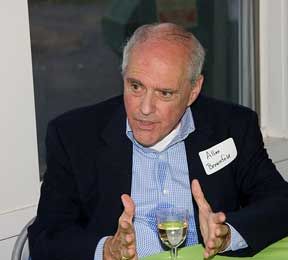
Publisher:
Bonnie King
CONTACT:
Newsroom@Salem-news.com
Advertising:
Adsales@Salem-news.com

~Truth~
~Justice~
~Peace~
TJP
Jan-18-2014 12:30

 TweetFollow @OregonNews
TweetFollow @OregonNews
How Congress Extorts Money From Those Who Have Business Before It
Allan Brownfeld Salem-News.comPublic understanding of what is really taking place in Congress is an important first step.
 dailykos.com |
(WASHINGTON, DC) - The U.S. Congress is held in increasingly low esteem. In his just-published book, "Duty: Memoirs of a Secretary at War," former Secretary of Defense Robert Gates provides us with this judgment of Congress:
"I saw most of Congress as uncivil, incompetent at fulfilling their basic constitutional responsibilities (such as timely appropriations), micromanagerial, parochial, hypocritical, egotistical, thin-skinned and prone to put self (and re-election) above country."
It may be even worse than that. In an important new book, "Extortion: How Politicians Extract Your Money, Buy Votes, And Line Their Own Pockets," Peter Schweitzer, president of the Government Accountability Institute and the William J. Casey Fellow at the Hoover Institution at Stanford University, shows us that the conventional wisdom about Congress may be wrong.
That conventional wisdom, he points out, holds that Washington is broken because outside special interests bribe politicians. Instead, he argues, the reverse is true: politicians have developed a new set of legislative tactics designed to extort wealthy industries and donors into making large donations----cash that lawmakers often funnel into the pockets of their friends and family.
Why, he asks, does Congress propose an endless number of bills when so few ever become law? His answer: the real purpose of legislation is to obtain donations from those with the most to lose from a bill's passage or defeat. And what of those lengthy pieces of legislation---such as tax code or the Affordable Care Act---which are filled with indecipherable jargon? He makes the case that there is an underground Washington industry made up of former lawmakers and staff members who reap millions from businesses needing help navigating the complex confusion they have intentionally created.
Schweitzer notes that, "While we have focused on the power that contributors have over officials, we have largely ignored the power that officials have over contributors. We have focused on the buyers of influence (those outside special interests), but paid little heed to the sellers of influence---bureaucrats and politicians....What if the problem is not bribery but extortion? What if the Permanent Political Class in Washington, made up of individuals of both political parties, is using its coercive public power not only to stay in office but to threaten others and to extract wealth, and in the bargain pick up private benefits for themselves, their friends and their families?...Far from being passive recipients of money and favors, they make it happen."
For the Permanent Political Class, Schweitzer points out, "They get paid either way. They can get paid for doing something, or they can get paid for not doing something. As they propose legislation that will harm or help certain companies and industries, they are simultaneously calling those affected and soliciting donations, on both sides of the issue. This is a wealth strategy unavailable to anyone in America today outside of politics."
In 2005, AT&T faced a myriad issues related to its Cingular cell-phone subsidiary. Schweitzer reports that,"It had been suggested that the company hire a new lobbyist. The one they selected was Joshua Hastert. It's not that Hastert was an expert in the cellular industry. Sporting a pierced tongue and goatee, he also didn't fit the part of a traditional power-lobbyist. His previous work experience included owning a record store in Illinois and a small music label called Seven Dead Arson. He also happened to be the son of the then-Speaker of the House, Dennis Hastert. For the Wireless Tax Fairness Act in 2011, AT&T hired a team of lobbyists that included William Clyburn, Jr., the cousin of the Democratic whip, Rep. James Clyburn of South Carolina."
What Schweitzer calls a "milker bill" is one which "gives politicians the opportunity to 'milk,' or squeeze, an industry for money. Whether the bill passes or not, the politicians still cash in. The best milker bills are those that allow the Permanent Political Class to squeeze two cows at the same time, one on each side of the issue."
Consider the example of what Schweitzer calls the two biggest "cash cows"---Hollywood and Silicon Valley. The issue: film studios, tv networks, and recording labels have battled on-line pirating and bootlegging for many years. On-line piracy pitted Hollywood against Silicon Valley. In April 2011, the Obama administration began holding fund-raising events in California targeting those who were on both sides of legislation which had been proposed to outlaw online piracy.
Silicon Valley had previously avoided politics. Schwetizer notes that, "Particularly exciting for the Permanent Political Class was the fact that Silicon Valley was suddenly fully engaged...Many in the high-tech field tend to be libertarians---they just want to be left alone....'They would rather be innovating,' Bob Herbold, the former COO of Microsoft told me....'We had to set up operations in Washington, and Bill (Gates) hated that sort of thing,' recalls Herbold. 'So I had to do it...You hear about bribery in China. They have nothing on us. We are just more sophisticated about it.'"
In all of this activity, Schweitzer points out, "Ex-politicians and their family members also had a nice payday. Google lapped up such ex-politicians as former majority leader Dick Gephardt and former congresswoman Susan Molinari...Comcast paid former Congressman William Gray and his son Justin's boutique lobbying firm $440,000 throughout 2011....The firm Dutko Grayling landed a $320,000 lobbying contract from Google. One of the managing principals at the firm is the brother of former Bush White House chief of staff Andy Card."
Disgraced Illinois Governor Rod Blagojevich, who tried to sell Barack Obama's U.S. Senate seat to the highest bidder, may be, in Schweitzer's vew, "the modern symbol of corruption." But "what is the difference," he asks, "between his attempted extortion and the legal forms we have examined? Perhaps Blago's real crime was simply a blunder: he lacked the soft touch and deftness that other politicians have mastered...Blago's ultimate mistake was not that he extorted---but that he extorted in broad daylight. What he did----trading government action for money or favors---happens all the time in Washington. He was often referred to as a classic 'Chicago pol,' suggesting that corrupt machine rule is a local affair. Yet most people forget that Blago served three terms in Congress. As Thomas G. Donlan of BARRON's posits, 'Since Blagojevich is apparently not smart enough to think up these ploys by himself, it's unpleasant but fair to believe that he learned them from experience in Washington while he was a congressman.'"
To understand how Washington really works it is important to put aside the often harsh partisan political rhetoric we hear and recognize that we confront a Permanent Political Class, made up of both Republicans and Democrats, with interests of their own which are often contrary to the larger public interest. Peter Schweitzer has provided a notable service in explaining this to us: "The power equation in Washington has shifted from the buyers to the sellers of influence. We all denounce 'special interests,' that is, lobbying by firms and industries. We should turn our attention to their counterparts. Our reform efforts have been almost exclusively devoted to restricting the activities of these special interests---in other words, ourselves----as opposed to the activities of the Permanent Political Class. This is unusual because when it comes to most industries in America---insurance, finance, and so on---most regulatory requirements fall on sellers, not buyers. Perhaps that doesn't happen in this case because it's the sellers who get to make the rules."
Schweitzer proposes a number of reforms, including a ban on solicitations or receipt of campaign contributions while Congress is in session, and placing an outright ban on contributions and solicitations involving lobbyists or government contractors. Since it is the Congress itself which would have to enact such reforms, the prospect for such change is slim. But public understanding of what is really taking place in Congress is an important first step. And with Peter Scweitzer's help, that is a step we can all take.

Salem-News.com contributor Allan C. Brownfeld received his B.A. degree from the College of William and Mary, his J.D. degree from the Marshall-Wythe School of Law of the College of William and Mary and his M.A. in Government and Politics from the University of Maryland. He has served on the faculties of St. Stephen's Episcopal School, Alexandria, Virginia, and the University College of the University of Maryland.
The recipient of a Wall Street Journal Foundation Award, Mr. Brownfeld has written for such newspapers as THE HOUSTON PRESS, THE RICHMOND TIMES DISPATCH, THE WASHINGTON EVENING STAR and THE CINCINNATI ENQUIRER. For many years he wrote three columns a week for such newspapers as THE PHOENIX GAZETTE, THE MANCHESTER UNION LEADER, and THE ORANGE COUNTY REGISTER. His weekly column appeared for more than a decade in ROLL CALL, the newspaper of Capitol Hill. His articles have appeared in such journals as THE YALE REVIEW, THE TEXAS QUARTERLY, THE NORTH AMERICAN REVIEW, ORBIS and MODERN AGE.
Mr. Brownfeld served as a member of the staff of the U.S. Senate Internal Security Subcommittee and was the author of that committee's 250-page study of the New Left. He has also served as Assistant to the Research Director of the House Republican Conference and as a consultant to such members of Congress as Reps. Phil Crane (R-Il) and Jack Kemp (R-NY) and to the Vice President of the United States.
He is a former editor of THE NEW GUARD and PRIVATE PRACTICE, the journal of the Congress of County Medical Societies and has served as a Contributing Editor AMERICA'S FUTURE and HUMAN EVENTS. He served as Washington correspondent for the London-based publications, JANE'S ISLAMIC AFFAIRS ANALYST and JANE'S TERRORISM REPORT. His articles regularly appear in newspapers and magazines in England, South Africa, Sweden, the Netherlands and other countries. You can write to Allan at abrownfeld@gmail.com
 |
 |
 |
Articles for January 17, 2014 | Articles for January 18, 2014 | Articles for January 19, 2014

Quick Links
DINING
Willamette UniversityGoudy Commons Cafe
Dine on the Queen
Willamette Queen Sternwheeler
MUST SEE SALEM
Oregon Capitol ToursCapitol History Gateway
Willamette River Ride
Willamette Queen Sternwheeler
Historic Home Tours:
Deepwood Museum
The Bush House
Gaiety Hollow Garden
AUCTIONS - APPRAISALS
Auction Masters & AppraisalsCONSTRUCTION SERVICES
Roofing and ContractingSheridan, Ore.
ONLINE SHOPPING
Special Occasion DressesAdvertise with Salem-News
Contact:AdSales@Salem-News.com

Salem-News.com:
googlec507860f6901db00.html

Terms of Service | Privacy Policy
All comments and messages are approved by people and self promotional links or unacceptable comments are denied.
[Return to Top]
©2025 Salem-News.com. All opinions expressed in this article are those of the author and do not necessarily reflect those of Salem-News.com.